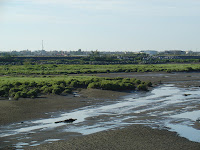1. 地 [dì]
In English: ground, floor, earth
Word origin: 地 Dì is made of 土 (soil, dirt) and 也 (also), to refer to the earth. The character also refers to any solid ground on which to stand.
2. 地板 [dì băn]
In English: (boarded) floor, (wooden) floor, floorboard
Word origin: 板is composed of 木 (wood) and 反 ( serves as the phonetic indication). It means "a board", especially "wooden board". The floor of an ancient house was normally paved with wooden boards and thus 地板 is used as such. It now refers to floor in general, regardless of the material.
3. 地上 [dì shàn]
In English: (on the) floor, (on the) ground, (on) earth
Word origin: 上uses an vertical line with one additional stroke on top of a horizontal line to indicate the meaning of "on top of". 地上 thus means "on top of the floor/ground".
4. 地位 [d wèi]
In English: position (in terms of social ranking)
Word origin: 位 is presented by a 人 (a person, a human being) 立 (standing) to refer to where the person is standing. Combining with地, 地位 means where on the ground a person is standing, implying the position of the social ranking.





No comments:
Post a Comment